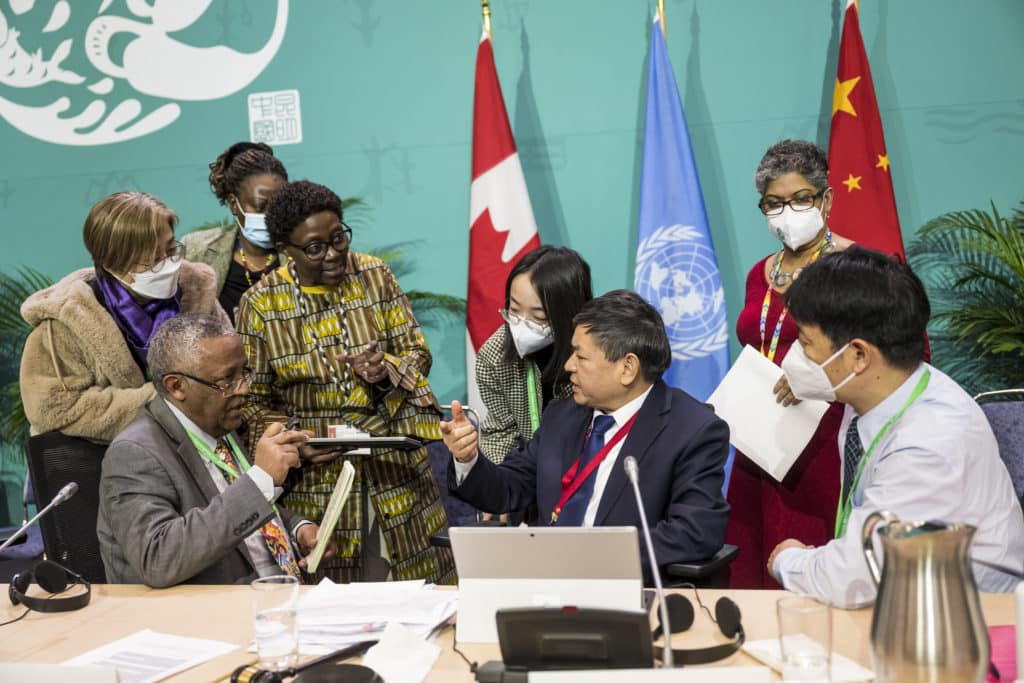COP15 wrapped up on December 19, and, as with every other international conference, there were polarising opinions on the productiveness of the aims that the participating parties so expertly self-proclaimed. Chaired by China but hosted in Montreal, Canada, the 15th Conference of the Parties to the United Nations Convention on Biological Diversity was held to finalise a global framework that can mitigate and eventually reverse the current tides of biodiversity loss. The following is a recap of what was achieved and what was not.
—
What Was Achieved?
1. Nations’ agreement for global biodiversity restoration
The main achievement that is at the tip of everyone’s mouths is the long-awaited adoption of the Kunming-Montreal Biodiversity Framework (GBF). Signed on the last day of the two-week-long summit, this agreement brings the issues of biodiversity loss and the urgency of restoring global ecosystems into perspective and perhaps also symbolises the delegates’ rolling up their sleeves in actually acquiring the targets ruled out. There are 4 overarching goals that characterise this document:
- Stop the extinction of species caused by humans and dramatically decrease all species’ extinction rate by 2050.
- Sustainable use and management of biodiversity to guarantee that nature’s contributions to humanity are acknowledged, preserved, and increased.
- Equitable distribution of advantages derived from the use of genetic resources, and digital sequencing information on these resources.
- All Parties, notably Least Developed Countries and Small Island Developing States, should have access to appropriate means of implementing the GBF.
You might also like: Historic COP15 Deal Provides Critical Financing to Save the World’s Biodiversity
Within these objectives, 23 targets are specified to further contextualise the GBF’s credibility, with the assurance that they will be met by 2030, with the following highlights:
- 30% restoration of terrestrial and marine ecosystems.
- Cut global food waste by 50%.
- Allocate at least US$200 billion per year from public and commercial sources for spending related to biodiversity conservation.
- Require international corporations and financial institutions to monitor, analyse, and publish in a transparent manner the risks and implications of their activities, portfolios, supply networks, and value chains on biodiversity.
- Raise annual international financial transfers from developed to developing nations to at least US$30 billion.
- Conserve and effectively manage at least 30% of the world’s land, coastal regions, and seas.
- Eliminate the loss of high biodiversity and ecological integrity habitats entirely.
Finance and funding are crucial in pushing the success of these goals in advance to their 2030 deadline. At COP15, a number of agreements pertaining to the GBF’s execution – including monitoring, reporting, resource mobilisation, assisting developing countries in fulfilling their duties, and the digital sequence information on genetic resources – were further endorsed. It was proposed that a Special Trust Fund contributed by all COP15 delegates be established immediately, so as to assist the implementation of the GBF Fund. The fund would supplement the necessary finances to guarantee the timely implementation of the GBF via a sufficient, predictable, and timely cash flow.
2. Mandating private investments for deforestation prevention
Aside from this, a mandate was also achieved at COP 15 to prevent deforestation via private investments. The Deforestation, Conversion, and Abuse-Free (DCAF) Investment Mandate from the non-profit Global Canopy includes instructions for assisting the development of investment portfolios that do not fuel deforestation and related human rights concerns, such as labour difficulties and indigenous peoples’ rights. The objective is to remove deforestation from portfolio assets within four years.
3. Indigenous-led conservations in Canada
Changes were motivated locally as well in the host country, as the Northernshelf Bioregion in British Columbia, the Qikiqtani Region in Nunavut, the Hudson Bay Lowlands in Ontario, and the coastlines of Western Hudson Bay and southern James Bay will get $800 million in financing over seven years, as announced by Prime Minister Justin Trudeau. This $800 million is in addition to the $118 million and $454 million spent in indigenous-led conservation efforts in 2018 and 2021, respectively, as part of a continuing reconciliation with Canada’s indigenous peoples to safeguard 25% of lands and waterways by 2025 and 30% by 2030.
You might also like: 10 Deforestation Facts You Should Know About
Controversies
Since the beginning of the conference, there have been protests and demonstrations that flooded the doors of Montreal. Hundreds of protestors who claim to be anti-capitalists and environmental activists held banners that read “Bloquons la COP15 (Block COP15)”, demanding governmental action in resolving environmental issues instead of negotiations after negotiations. Many of them expressed that the protection of nature should not be exclusive to world leaders and organisations, and discussions should not happen behind closed doors.
“They want to pick and choose which parts of us to include,” said Ta’kaiya Blaney of the Tla’amin Nation (a small group of Indigenous women from Canada’s West Coast), “They demand Indigenous expertise to solve colonial issues yet refuse to halt colonial conflict.”
Police monitor a protest opposing COP15, the UN Biodiversity Conference, in Montreal, on Wednesday. (Graham Hughes / The Canadian Press)
This anti-sentiment towards the conference also came from the Indigenous community. Extractions and deforestation have continued in Canada despite the opposition of indigenous people, which led to a wide distrust between indigenous communities and the Canadian government.
Most controversies surrounding COP15 are rooted primarily in its initiation: Is the conference just for show? Are the resources spent to hold such a big summit justifiable with mere agreements and paperwork?
The worry from these protestors is believed to stem from the failures of the previous COP15 held in Copenhagen in 2009. The summit lacked organisation in putting theoretical solutions into practice, many countries agreed on the courses of action towards sustaining biodiversity but refused to adopt restrictive measures to limit carbon emissions. Furthermore, as witnessed in the past COPs, the coping of major environmental issues, such as biodiversity loss and nature degradation, have been reduced to a singular perspective: money. In true capitalist fashion, much of the discussions at this year’s COP15 revolved around funding and the affordability of countries to carry out plans. This ultimately leads to another question: Is the combination of money and legislation enough to save us from global biodiversity devastation? What about advocacy? Evaluation? Education?
“Funds alone will not guarantee success,” says Dinaman Tuxa from the Articulation of Indigenous Peoples of Brazil. “The people need to be leading the process from start to finish.”
Did COP15 Succeed or Fail?
Big international conferences like COP15 and COP27 often begin with the right intentions but end in enigmas. It provides young people who pay attention and would like to contribute to the survival of our planet a medium to rest their moral conscience, but in actuality, its overall effectiveness is often up for debate. Unlike previous biodiversity COPs, this one succeeded in pushing forward an official agreement that binds participating delegates to achieve their promises, which could be interpreted as a step forward. But it is too early to determine whether they will turn into reality.
There are certainly reasons to be hopeful. COP15 is an opportunity to revitalise efforts to safeguard wildlife on Earth. But experts agree that lofty speech and ambitious goals are insufficient. To guarantee that objectives are met, it will be necessary to enact stricter laws and regulations and to make additional advocacy efforts in conservation.
Featured image: UN Biodiversity (Flickr)
You might also like: Did COP27 Succeed or Fail?




















